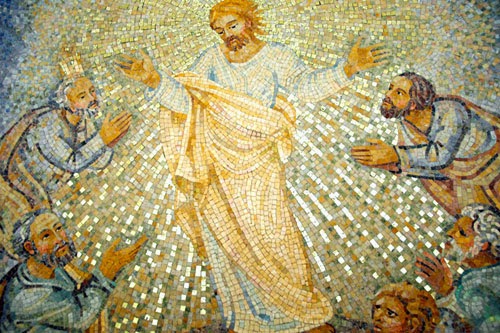Thanks be to God, who delivers me through Jesus Christ our Lord! (Romans 7:25)
In Romans 7:7-24, Paul describes the experience of a person trying to live apart from Christ and the Spirit. In verses 7-13, it is the man who is trying to live by the Law of Moses. In verses 14-24, it is the man trying to live by his conscience. Both sense condemnation, because they are trying to live by the “flesh,” that is, by their own resources. It ends with a cry of despair in verse 24: “What a wretched man I am! Who will rescue me from this body that is subject to death?”
But then the answer appears: “Thanks be to God, who delivers me through Jesus Christ our Lord!” The Lord Jesus delivers us from the terrible experience of trying to live by the flesh, out of our own resources. Paul then goes on to make a startling declaration: “Therefore, there is now
no condemnation for those who are in Christ Jesus, because through Christ Jesus the law of the Spirit who gives life has set you free from the law of sin and death.”
In Romans 7, the man trying to live by the “flesh,” whether by Law or by conscience, knows despair. But in Romans 8, there is no condemnation and no despair
for those who are in Christ. That is our new starting point, and Paul speaks about living by the Spirit rather than by the “flesh” (v. 4).
What a night and day difference! And Paul goes on to describe it — a whole new reality, made real by Christ through the Spirit of God — and there are several things to notice:
But if Christ is in you, then even though your body is subject to death because of sin, the Spirit gives life because of righteousness. And if the Spirit of him who raised Jesus from the dead is living in you, he who raised Christ from the dead will also give life to your mortal bodies because of his Spirit who lives in you” (Romans 8:10-11).
Even now, the Spirit of God is giving new life to us — he himself is living in us — and that changes us (how could it not?).
The Spirit you received does not make you slaves, so that you live in fear again; rather, the Spirit you received brought about your adoption to sonship. And by him we cry, “Abba, Father.” The Spirit himself testifies with our spirit that we are God’s children. (Romans 8:15-16)
There is no fear of condemnation in this, for that would send us back into the bondage Paul described in Romans 7:7-24, from which Jesus has already rescued us. But the new reality is that the Spirit in us has made us sons and daughters of God, so that we call on God as our
Abba, that is, our Father.
The divine Spirit “testifies with” our spirit. The Greek word is
symmartureo and has to do with something happening together with something else: The Spirit of God in us
testifies together with our spirit. What is the testimony it bears with us? That we are God’s children. Paul draws out the significance of this a bit further:
Now if we are children, then we are heirs — heirs of God and co-heirs with Christ, if indeed we share in his sufferings in order that we may also share in his glory. (Romans 8:17)
There are a few words here I especially want you to notice. One is “co-heirs.” The Greek word is
synkleronomos, and it too has to do with something happening together with something else. As God’s children, we are heirs of God —
heirs together with Christ. Next is the word that is translated, “share in his sufferings,”
sympascho. It means to
suffer together with Christ. The third word, translated as “share in his glory” is
syndaxazo, and means to be
glorified together with him. Paul adds, “I consider that our present sufferings are not worth comparing with the glory that will be revealed in us” (v. 18).
There is a real theme of “togetherness” developing here, and we see it again in verse 22, where creation is waiting for the mature children of God to be revealed and it is at last liberated from its bondage to corruption and decay:
We know that the whole creation has been groaning as in the pains of childbirth right up to the present time.
The words to note here is the ones for “groaning” and “pains of childbirth,” which are
systenazo and
synodino. The first means to groan together and the second means to travail together, as in the pains of childbirth. This groaning and travailing together is about giving birth to something, waiting for it to be born.
Not only so, but we ourselves, who have the firstfruits of the Spirit, groan inwardly as we wait eagerly for our adoption to sonship, the redemption of our bodies. (Romans 8:23)
We are groaning together with creation, waiting for the full expression of what the Spirit of God has already begun in us. We have already received the firstfruits of it, the Spirit himself, who produces in us the fruits of the Spirit (Galatians 5:22-23). He is already at work in us to bring them forth in our lives. The “baby” is growing within and we are groaning along with creation in labor pains.
In the same way, the Spirit helps us in our weakness. We do not know what we ought to pray for, but the Spirit himself intercedes for us through wordless groans. (Romans 8:26)
The word for “helps” here is
synantilamanomai. It means that the Holy Spirit
takes hold together with us. He does not take hold
for us but
with us — he is our partner in this all the way. However, the Spirit
does intercede
for us because, as Paul says, we do not know what we ought to pray. But notice that he does it through wordless
groans. All creation groans together in labor pains, and we groan along with it — and the Spirit is groaning within us too. He is in the process of giving birth to something.
And we know that for those who love God all things work together for good, for those who are called according to his purpose. (Romans 8:28)
The climax of all this togetherness is this: For those who love god, all things
work together for good, for those who are called according to his purpose. The operative word there is
synergeo, “work together.” What things is Paul talking about? All the things he has already mentioned:
- The Spirit of God testifying together with our spirit.
- Being heirs together with Christ.
- The things we suffer together with Christ.
- Being glorified together with Christ.
- All creation groaning together in the pangs of childbirth.
- The Spirit of God taking hold together with us.
All
these things are always working together for our good, to conform us to the image of Christ (v. 29), which is the revelation of the mature children of God that all creation has been eagerly anticipating.
Paul began his response to the Romans 7 predicament with the deliverance we have in the Lord Jesus and the fact that there is now no condemnation for us in him. Now he comes around full circle in a most memorable passage:
What, then, shall we say in response to these things? If God is for us, who can be against us? He who did not spare his own Son, but gave him up for us all — how will he not also, along with him, graciously give us all things? Who will bring any charge against those whom God has chosen? It is God who justifies. Who then is the one who condemns? No one. Christ Jesus who died--more than that, who was raised to life — is at the right hand of God and is also interceding for us. Who shall separate us from the love of Christ? Shall trouble or hardship or persecution or famine or nakedness or danger or sword? As it is written:
“For your sake we face death all day long; we are considered as sheep to be slaughtered.”
No, in all these things we are more than conquerors through him who loved us. For I am convinced that neither death nor life, neither angels nor demons, neither the present nor the future, nor any powers, neither height nor depth, nor anything else in all creation, will be able to separate us from the love of God that is in Christ Jesus our Lord. (Romans 8:31-39)
The reality of this — and the answer to the desperate situation in Romans 7:7-24 — is found in living by the Spirit, in the love of the Father through our Lord Jesus Christ.









